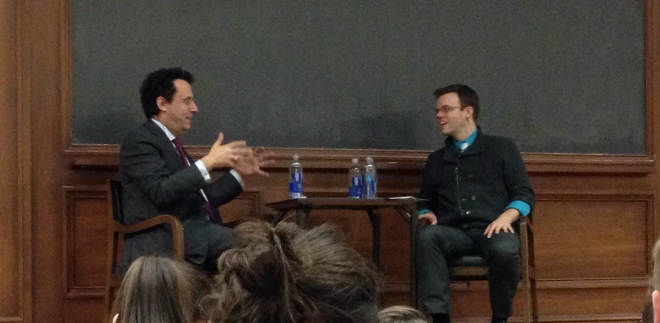
Award–winning playwright and screenwriter Tony Kushner spoke with English and gender & sexuality studies Professor Nicholas Davis before a packed Harris Hall audience Tuesday evening. Known for his play Angels in America as well as the films Munich and Lincoln, Kushner discussed the political themes and processes behind his works as a part of the Contemporary Thought Speaker Series.
"As an artist your only job, in a way, is to find a way to tell the truth," Kushner said of activist overtones in his writing. "The greatest enemy, usually, to the truth is you...You’ll notice there are fields of silence surrounding certain kinds of articulation and you can ask yourself 'Why is it hard to say this thing on a public platform.'"
While remaining apolitical when discussing art as activism, Kushner didn’t hesitate to espouse some of his left–leaning positions as the night went on, describing the 2000 presidential election as "a theft" and conservative political commentator Pat Buchanan as a "snarling wolverine."
Choosing a speaker who satisfied not just the artistic appetite but the political one was no mistake, said Weinberg junior Joe Eichenbaum, a member of the CTSS board who introduced Kushner.
"Kushner seemed like he would get at the best cross–section of campus," Eichenbaum said. "So when we saw that he was available, we pulled the trigger."
Communication freshman Nastasya Popov describes herself as a big Kushner fan, especially his 1991 play Angels in America about intersecting stories during the 1980s AIDS crisis. Despite the politically heavy themes his works, Popov said she was more interested in hearing about his art than his activism.
"The political side of his works is already pretty clear," Popov said. "You read his work and it's very natural. I think it’s very important to him, but I don’t think he’s pushing his message."
The Pulitzer Prize–winner didn’t shy away from mechanics of writing, explaining how Angels in America expanded from a planned two hour play when outlined, to a two–part, seven–hour performance. Before the experience, Kushner said he didn’t understand what writers meant when they said characters "had a mind of their own."
"Immediately when I started working on Angels, I kind of got what they were talking about," Kushner said. “The characters were really just not interested in the outline."
Although Kushner’s work for the stage dominated his conversation with Professor Davis, the writer was still able to talk about his screenwriting, specifically his experience with Steven Spielberg.
"We really worked together on this," Kushner said of his experiences on both Munich and Lincoln. "He really involved me in the conversations and arguments. He’s a great collaborator. I never felt shutdown."
Where many see Kushner’s craft meeting his activist ideals is in his use of historical elements. Kushner himself may have described why this device works to marry the two.
"History is the way that the human race remembers what it’s been through," Kushner said to North by Northwestern after the event. "Without memory we have no path to the future."